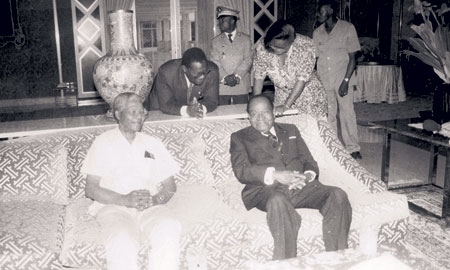On December 7 2013, Côte d’Ivoire commemorated the 20-year anniversary of the death of Félix Houphouët-Boigny. Considered by many as the founder of the modern Ivoirian nation, this celebrated figure held the successive titles of tribal chief, physician, planter, union leader, MP, deputy to the French National Assembly, French Cabinet minister, President of the Ivoirian National Assembly, Mayor of the city of Abidjan, Prime Minister and finally, President, leading Côte d’Ivoire from its independence in 1960 until his death in 1993.
Mr Houphouët-Boigny was Africa’s oldest and longest-serving head of state when he died, 33 years after helping Côte d’Ivoire achieve national sovereignty.
According to official accounts, Mr Houphouët-Boigny was born in 1905 in Yamoussoukro, a small village 250km north of the capital city Abidjan. The son of a wealthy chief, Mr Houphouët-Boigny received French schooling and later completed medical training in Dakar, Senegal. He began challenging the colonial hierarchy soon after returning to his native country and taking up work as a physician in Abidjan. There, he began to organise with his colleagues, calling into question the preferential treatment given to French practitioners over native Africans. As a result, colonial administrators transferred him to a rural outpost near the Liberian border.
There, Mr Houphouët-Boigny practised medicine and embarked on a second career planting cash crops. Again, he came up against the prejudices of the colonial system, this time in the form of a law requiring compulsory labour for the benefit of French landowners. He responded by forming an agricultural trade union in 1944 that soon grew into a popular movement. With this, he began his successful foray into politics.
A steadfast supporter of constructive relations with France, Mr Houphouët-Boigny worked tirelessly to cultivate support and goodwill from inside the governing system, all the while fighting for and winning freedom and independence for French subjects in Africa. As a member of France’s parliament, he pushed for the passage of a 1946 law that abolished forced labour in the African colonies. In 1956, he became the first African appointed to a French Cabinet. Mr Houphouët-Boigny went on to serve as minister in four consecutive French governments during the tumultuous Fourth Republic, and participated in the drafting of the new French Constitution of October 4 1958.
“I beat the paths. It falls to my successors to make them bigger, deeper and to develop them”
Félix Houphouët-Boigny,
the first President
of Côte d'Ivoire |
From this position of power, he moved forward a series of laws that paved the way for greater autonomy in French-controlled Africa, and eventually, independence, which Côte d’Ivoire proclaimed in 1960 along with 16 other sub-Saharan African nations.
Mr Houphouët-Boigny came to be known as one of Africa’s “fathers of independence,” but he differed markedly from his contemporaries in choosing the path of collaboration rather than antagonism. These ties proved fortuitous. Mr Houphouët-Boigny employed thousands of French citizens in his government, who provided much-needed expertise in technical and advisory roles.
The new president also fostered a friendly environment for international trade and tourism. Between 1960 and 1980, the number of French citizens living in the West African nation nearly doubled. Until 1985, Côte d’Ivoire remained France’s number one trading partner on the continent, and had the highest number of French multinational businesses in all of Africa.
As head of a newly founded state, Mr Houphouët-Boigny championed economic development, most notably in agriculture, making the West African republic an island of progress on a continent plagued by poverty. His first two decades in office are often referred to as the “Ivoirian miracle,” as Côte d’Ivoire became a world leader in the production of cocoa, coffee, pineapples and palm oil.
Meanwhile, per capita income rose to be the second highest on the continent. Between 1960 and 1980, Côte d’Ivoire’s population doubled, but GDP quadrupled, according to IMF statistics. During this time, Cote d’Ivoire achieved an impressive average annual GDP growth rate of 7 per cent, while yearly export growth averaged over 10 per cent.
“I beat the paths. It falls to my successors to make them bigger, deeper and to develop them,” the ‘Sage of Africa’ liked to remark. Mr Houphouët-Boigny had just one dream: make the Côte d’Ivoire into a regional economic power. All his life, he fought so that his country would be considered among the world’s greatest. Roads, highways, hydroelectric dams, gas turbines, administrative and religious landmarks, and elite universities were all constructed in this spirit. Considered imperious at the height of his power, now the country looks back on a man who was ahead of his time.
His public works, once regarded as Pharaonic, now constitute the pride of a nation. The latest evidence of Mr Houphouët-Boigny’s grand vision came to fruition on December 11 2013, when work was completed on the Abidjan-Yamoussoukro highway, forever linking Abidjan, Côte d’Ivoire’s largest city and commercial centre, with the place of his birth – once a village and now the country’s political capital and home to the Basilica of Notre-Dame de la Paix, the world’s largest church.
‘Le vieux’, as he affectionately came to be known, achieved lasting fame through his pursuit of liberation through moral pressure, rather than conflict. “We have always preferred negotiation in all circumstances, because we are convinced that a compromise acceptable to everybody can emerge from a confrontation of the ideas and interests in question,” he told the Royal Institute of International Affairs in London, in 1962.
Since 1989, UNESCO has awarded the Félix Houphouët-Boigny Peace Prize in his name, to honour the “peace and humanism of a legendary African figure”. Recipients – among them Nelson Mandela and Jimmy Carter – memorialise the unique spirit and worldview of a man who challenged his oppressors by holding them to their own ideals. In his words, “Our combat is not over, it will never be over. The real combat, the combat for peace is still going on.”

0 COMMENTS